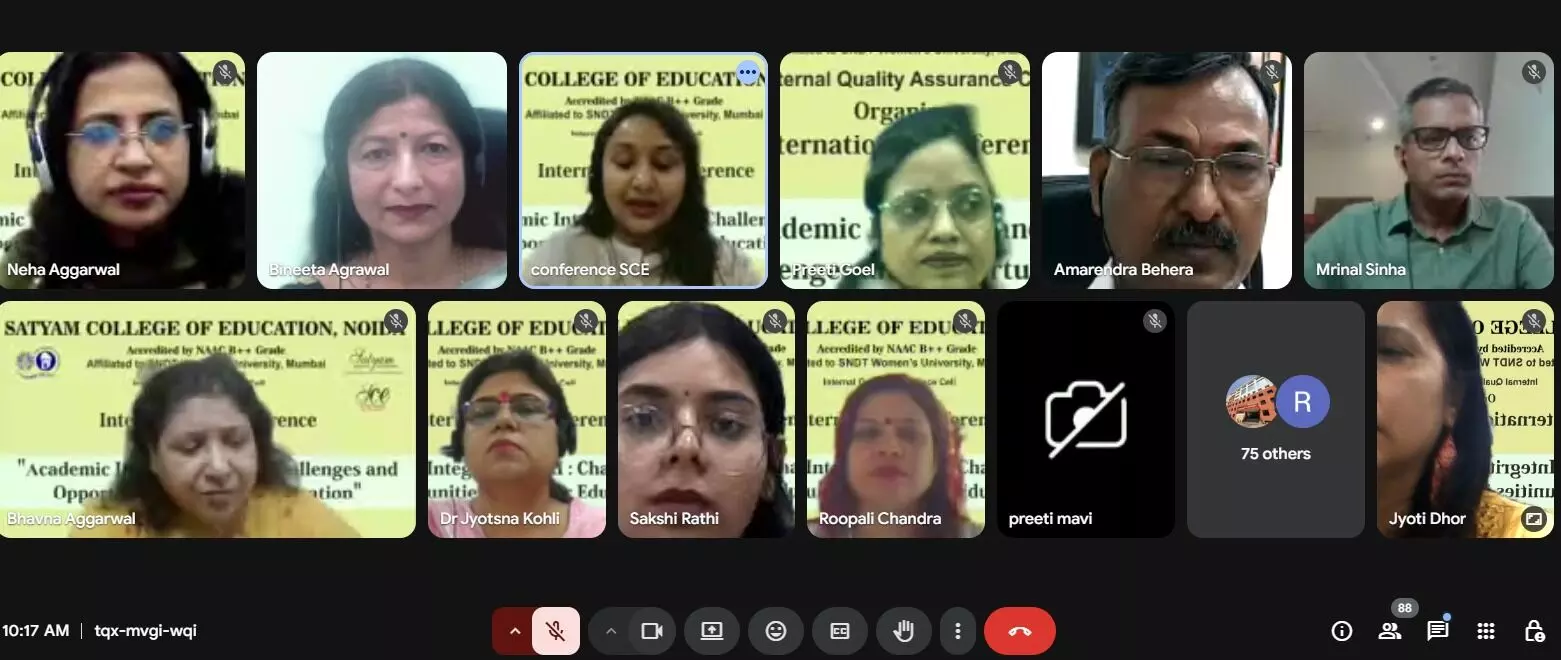International Conference on Academic Integrity and AI Convenes in Noida

International Conference on Academic Integrity and AI: Challenges and Opportunities in Higher Education Successfully Convenes in Noida Sector -62*
On June 20, 2025: Satyam College of Education, Noida successfully hosted a one-day international conference titled "Academic Integrity and AI: Challenges and Opportunities in Higher Education" on June 20, 2025. The conference aimed to foster critical reflection and dialogue on pivotal issues such as academic integrity, ethics, and educational quality amidst the escalating influence of Artificial Intelligence (AI) in higher education.
Dr. Bineeta Agrawal, Principal of Satyam College of Education, extended a warm welcome to the esteemed dignitaries, speakers, researchers, and participants.
The Chief Guest, Professor (Dr.) Amarendra Behera, Joint Director, CIET, NCERT, provided an invaluable national perspective on the transformative role of AI within the educational landscape. He highlighted the increasing integration of AI in education and its associated ethical implications.
A cornerstone of the event was the keynote address delivered by Dr. Obehi Sule, Senior Lecturer and Academic Developer at Anglia Ruskin University, UK. Her presentation left an indelible mark on all attendees; her global expertise and visionary outlook undeniably provided a broader, more enlightened understanding of AI's complex impact.
Dr. R.C. Sharma, a seasoned expert in open and distance learning with a strong focus on technology-mediated education, also contributed significantly, enriching the discussions on bridging the gap between technological advancements and accessible education.
The conference featured several technical sessions and paper presentations covering a diverse range of topics, including AI, academic integrity, opportunities and challenges for educators with AI, redefining teaching-learning processes with AI, redefining plagiarism in the age of generative AI, and policy suggestions. Eminent speakers, researchers, and experts from across the country participated, sharing their experiences, research, and perspectives. Sessions were skillfully chaired by Dr. Sameer Babu M , associate professor from Jamia Millia Islamia, Mr. Mrinal Sinha, an expert in AI and Machine Learning.
The conference concluded with Dr. Obehi Sule thanking the participants for their active engagement; the intellectual tone she established will undoubtedly resonate through future discussions and initiatives related to artificial intelligence.
Analysis
The conference effectively underscored the necessity of a balanced approach to AI adoption in higher education, consistently emphasizing the paramount importance of academic integrity, ethics, and overall educational quality. The rich discussions and insightful presentations highlighted both the challenges and opportunities presented by AI in education, including its potential to significantly improve teaching-learning processes, enhance student engagement, and increase accessibility.
However, the conference also meticulously addressed concerns regarding the ethical implications of AI in education, encompassing critical issues such as data privacy, algorithmic bias, and accountability. Participants unanimously stressed the imperative for policymakers, educators, and researchers to collaborate in developing robust guidelines and comprehensive frameworks for the responsible deployment of AI in educational settings.
Overall, the conference served as an invaluable platform for stakeholders to engage in meaningful discussions and reflections on the evolving role of AI in higher education, highlighting the profound need for a nuanced and well-informed approach to AI integration within the educational sphere.
Key Takeaways:
1. A balanced approach is crucial for AI adoption in higher education, prioritizing academic integrity, ethics, and educational quality.
2. There is an urgent need for the development of comprehensive guidelines and frameworks to ensure the responsible use of AI in education.
3. Data privacy, algorithmic bias, and accountability are critical considerations in the design and implementation of AI-based educational systems.
4. AI holds significant potential to enhance teaching-learning processes, improve student engagement, and increase accessibility in education.
5. Collaborative efforts among policymakers, educators, and researchers are essential to develop informed and effective approaches to AI adoption in education.
